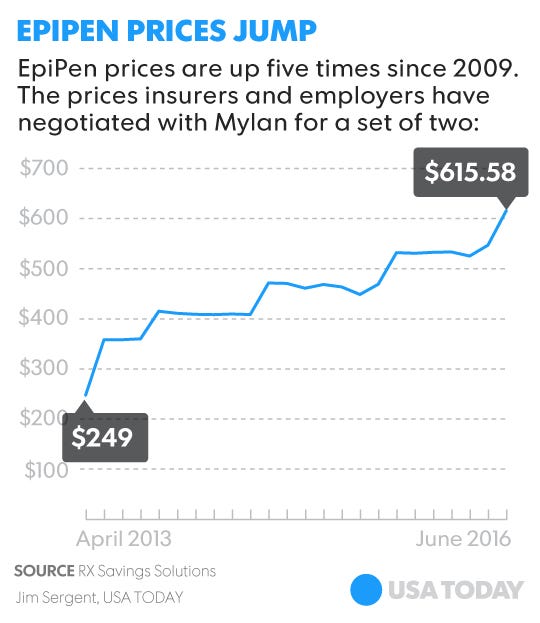EpiPen maker to offer discounts after price hike firestorm
Drugmaker Mylan (MYL) said Thursday that it would offer discounts on a life-saving allergy shot after generating a firestorm when it implemented sharp price increases for the treatment.
The company said it would offer coupons covering up to $300 "for patients in health plans who face higher out-of-pocket costs" for the EpiPen Auto-Injector treatment.

Mylan also said it would double the income level at which families are eligible for assistance in purchasing the medication to 400% of the federal poverty level, which stands at $24,300 for a family of four. The company said a family of four with income up to $97,200 won't pay out of pocket.
"As a mother, I can assure you, the last thing that we would ever want is no one to have their EpiPen due to price," Mylan CEO Heather Bresch said on CNBC in an interview. "Our response has been to take that immediate action of making sure everyone has an EpiPen."
EpiPen's steady price increases masked until deductibles rose
Almost immediately, critics assailed Mylan's discount announcement, saying the list price isn't changing and that ultimately consumers will bear most of the costs.
The average wholesale price of EpiPen has increased by nearly 500% since 2009, while the price that insurers and employers pay to Mylan is up 150% since 2013, according to Rx Savings Solutions, which represents businesses and insurance companies. There's no generic equivalent and no brand-name competitor.
Politicians and patient advocates have criticized Mylan for the price increases, describing the company's actions as emblematic of the drug industry's unfair stranglehold on the market for life-saving treatments.
"Nobody is buying this PR move anymore," Rep. Elijah E. Cummings, D-Maryland, ranking member of the House Committee on Oversight and Government Reform, said in a statement. "Mylan should not offer after-the-fact discounts only for a select few—it should reverse its massive price increases across the board immediately. Drug company CEOs are using a corrupt business model to profit off of our most vulnerable citizens and using them like ATMs."
Bresch vigorously defended the price hikes, arguing that the U.S. health-care framework "incentivizes higher prices" through a complex thicket of drug companies, insurers, health-care providers and pharmacy benefit managers.
"There's no question, the system is broken," she said. "There's no transparency, there's no clarity and no one knows what anything costs."
The consumer cash price of a two-pack EpiPen is $600 — and although few patients pay full price out of pocket, people with high-deductible plans and who lack insurance often have to do so. Besides, the costs are still borne by the health-care system, thus increasing everyone's costs.
"Congress does need to do something to change this picture," said Marianne Udow-Phillips, director of the Center for Healthcare Research & Transformation at the University of Michigan. "This is a perfect demonstration of the complexity and real problems with pharmaceutical pricing in this country."
Mylan hiked the price of EpiPen to maximize profits in anticipation of a generic competitor from Teva Pharmaceutical Industries, Udow-Phillips said. But the U.S. Food and Drug Administration dealt Mylan's competitor a sharp setback, saying it wasn't ready to hit the market and delaying the drug until at least 2017.
"Mylan frankly knew that they had a monopoly," she said.
The controversy over Mylan's move has also cast a spotlight on Bresch's compensation. She received total compensation of $18.9 million for the 2015 fiscal year, according to the company's proxy statement.
That's down 27% from 2014's $25.8 million but more than double 2013's $9 million.
Bresch bristled at CNBC anchor Brian Sullivan's question asking whether "you understand how that looks."
"Brian, I understand better than anyone that facts are inconvenient to headlines," she responded.
Mylan shares (MYL) have lost more than 12% of their value this week, falling to $42.85 at Thursday's close.
Meanwhile, investors are fretting that pharmacy benefit managers that negotiate deals with drug companies through contracts with insurers could also take a hit as the political winds shift against drug profits. Shares of CVS Health (CVS) fell 3.5% to close Thursday at $93.78, while shares of Express Scripts (ESRX) tumbled 6% to $71.74.
As Congress rains down fury on Mylan and other drug companies that have ratcheted up prices, Bresch pledged to collaborate with lawmakers to address the matter. She said she had offered to meet with several key members of Congress and is waiting to hear back.
Meanwhile, patient advocates excoriated Mylan.
“We have to stop pretending this is a surprise,” said Leonard Saltz, chief of gastrointestinal oncology at New York's Memorial Sloan Kettering Cancer Center, who has been an outspoken critic of high prices for new cancer drugs.
“This sort of price gouging has become persistent and routine in the pharmaceutical industry, and the massive pharmaceutical lobby in Washington spends enormous amounts of money lobbying to protect its ability to do this sort of thing. It is driving up health care costs, which is bad for the economy, but more importantly, is bad for patients."
What's unclear is whether Congress will act — and if so, what it can do.
One problem is that the U.S. government relinquished the ability for Medicare to negotiate price increases in a deal to gain the pharmaceutical industry's support for the Affordable Care Act, Udow-Phillips said.
Democratic presidential candidate Hillary Clinton has called for Medicare to regain that bargaining leverage.
"There is no other developed country in the world that pays for pharmaceuticals like we do," Udow-Phillips said. "They all have some price controls."
The U.S. affords patent protection to drugmakers to encourage innovation.
Contributing: Liz Szabo.
Massive price increases on EpiPens raise alarm

Follow USA TODAY reporter Nathan Bomey on Twitter @NathanBomey.